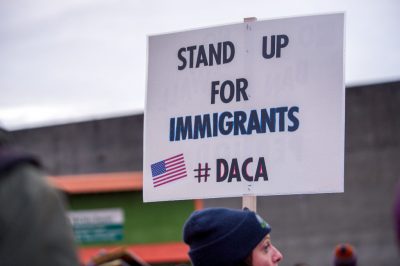US Immigration (ICE) Accelerates Violent Arrests of (Deferred Action for Childhood Arrivals) DACA Holders

“You are not from the castle. You are not from the village. You are nothing.” Franz Kafka, “The Castle”
“If there were right laws, if there were a pathway, we would stand in line…. Because this country has a broken, outdated immigration system, we cannot legalize ourselves. There is no pathway to citizenship for people like us,” Bambadjan Bamba, DACA-recipient and “Black Panther” actor, speaking in front of the Supreme Court, November 2019
Daniella Ramírez arrived at her hotel job in Los Angeles at 4:45 AM on December 20, 2019. Three white, unmarked vans were idling nearby, which seemed a little odd but she ignored them on her way to the entrance. As she turned to open the door, several men rushed, grabbed and handcuffed her. Eventually they informed her she was under arrest by ICE (Immigration and Customs Enforcement).
She had only a short moment to phone a friend to say the men were being very rough with her before the line went dead. On Sunday, her family learned she was being held in Adelanto Detention Center, a GEO Corporation private immigration jail that the Department of Homeland Security (DHS) itself qualified as having “serious health and safety issues” such as “nooses in detainee cells”.
Daniella is a 23 year old female with no criminal record. She has lived in the United States since she was brought there by her parents when she was 10 years old. DACA (Deferred Action for Childhood Arrivals) gave her, and about 700,000 other undocumented young people in the United States, a valid driver’s licence, a work permit, and a reprieve from deportation. She has been working at the hotel for the last two years, during which time her DACA permit expired. People were being arrested when they reapply, even if they were paying a lawyer. There was no right way, there still is no right way. She just had to keep going and hope for the best.
Warning on Immigration Equality’s website
Her arrest is but one of a number of actions that the federal government is taking as the country awaits the Supreme Court’s decision on ending DACA after justices met in early November.
According to immigration attorneys, ICE suddenly began reopening deportation cases against DACA-holders at the end of October in anticipation of what the current federal government would consider a favorable ruling. And now, ICE has made it official in an email to CNN:
“ICE confirmed to CNN that all DACA recipients whose deportation cases have been administratively closed can expect to see them reopened. In an email, the agency stated that ‘re-calendaring of administratively closed cases is occurring nationwide and not isolated to a particular state or region.’”
The move is particularly egregious in light of the strict requirements to obtain DACA status. Formulated to protect immigrants who had been brought to the United States as children and were never granted legal status, DACA has age, residency, educational and legal requirements, and carries hefty fees. Misdemeanors disqualify applicants.
Despite this, President Donald Trump’s insisted in a November 12 tweet that, “Many of the people in DACA, no longer very young, are far from ‘angels.’ Some are very tough, hardened criminals.” His contention is contradicted by the government’s own calculations that DACA-recipients have an exceptionally low arrest rate of 6.7% compared to 30% for the general population, according to the Cato Institute. PolitiFact and NBCMiami rated the tweet with a resounding “False”.
DACA is/was available to persons up to the age of 31 who had come to the United States when they were younger than 16. Some of them, as well as others who could not apply, already have children. The Comité Popular Somos Raleigh (We Are Raleigh Popular Committee) held a “posada” this season for children whose parents have been deported. The “posada” is a traditional Mexican celebration that recreates the Biblical story of Mary and Joseph’s search for a place to rest and give birth to the baby Jesus, and includes the famous breaking of the piñata, spilling treats for all the children.
Speaking to local newspaper Qué Pasa, committee organizer Griselda Alonzo said that her group organized the event in light of the marked increase in raids in the region and how acutely this is affecting the children left behind.
“The committee was formed to support these families because sometimes they call at midnight because there was a raid and somebody was detained. The committee works to help get people out of jail, raise bond money, or take the children to visit their relatives in jail,” Griselda explained. “Even though for some of them it’s been over a year, the pain is still there, and the holidays are very sad and become more a period of mourning than of celebration. That’s why we started to do [the posada].”
*
Note to readers: please click the share buttons above or below. Forward this article to your email lists. Crosspost on your blog site, internet forums. etc.
Featured image is from Univision


